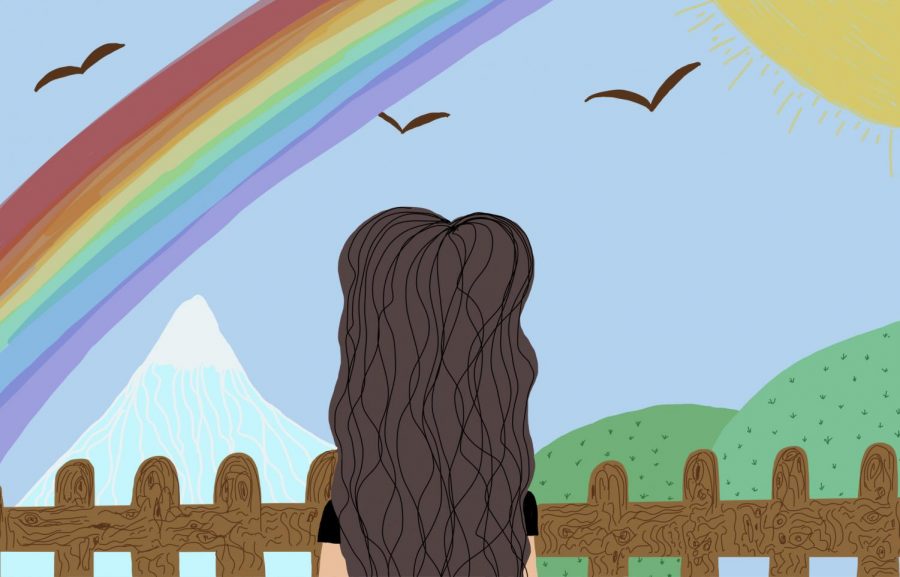Through the Highest Highs, and the Lowest Lows, Kacey Musgraves’ “Golden Hour” Appreciates It All
Even on the darkest day of winter, “Golden Hour” could provide a sense of warmth in a way most albums cannot.
May 19, 2021
Following a visit to my doctor’s office on a painfully average Monday, I decided to make a detour on my way home and drive through the Columbia River Gorge — an area that has always reminded me of my childhood, and of Earth’s natural beauty.
As I appreciated the waterfalls and cliff sides, on a day without a cloud in the sky, I struggled to find the perfect song to accompany my observations. After countless skips, Musgraves’ song “Butterflies” began to bring out the exact joyous emotions that I was feeling during my drive.
“It’s hard to breathe when all you know is the struggle of staying above the rising water line,” sings country singer Kacey Musgraves on her 2018 album “Golden Hour,” which serves as a love letter to the world and a reminder that it’s okay to take your time.
I am a firm believer that good music does not equal sad music, and through this album, Musgraves has provided me with the perfect ammunition to back my claim. Even on the slowest, and heaviest songs, I was left feeling an overwhelming presence of hope as the final chord passed through my head.
Although I definitely have favorites from the album as well as tracks I skip from time to time, I feel that “Golden Hour” has achieved a goal that all albums strive for: having no bad songs.
The opening track “Slow Burn” shows appreciation for patience and taking the time to savor the little things. Musgraves speaks on her contentment with life and encourages listeners to take the long route, and “look at all the flowers.”
Following “Slow Burn” is the ode to optimism — “Butterflies.” The infamous feeling of getting butterflies in your stomach is the baseline for the track, as it discusses the nerves and excitement that come with a new relationship.
Roughly 10 minutes into my first listening experience, “Oh, What a World” began to play through my car speakers, and within seconds, I could tell it would be a highlight on the album. I can’t imagine there are many songs that would’ve served as better soundtracks for my drive in the Gorge. As I approached the Vista House, I was overcome with emotion, and I began to reflect on Oregon’s beauty that I so often ignore.
The next track that caught my attention was track seven, titled “Space Cowboy.” When you imagine the phrase “space cowboy” in your head, I doubt you automatically assume Musgraves’ focus on giving a suffocating partner room to think in the midst of a failing relationship. Although the circumstances of the situation could bring on feelings of sadness, Musgraves approaches the situation with acceptance.
Immediately following “Space Cowboy” is the track “Happy & Sad,” where Musgraves describes the fear and emotion that comes with life’s happiest moments. I found this song to be the most relatable on the album, as I’ve struggled with anxiety my entire life and this song captured the pre-panic attack feeling I’ve always failed to put into words.
A line that particularly stuck with me arrives just 30 seconds into the track. “I’m the kind of person who starts getting kind of nervous, when I’m having the time of my life,” Musgraves . Immediately after hearing those words I thought to myself, “If I have a senior quote, I think this line might have to be it.”
The album closes with the lead single “Rainbow.” The song brings some feelings of sadness, but in a way that is 100% temporary. Musgraves sings about the rainiest, darkest days, and how in the end, you will always be greeted by a rainbow.
Upon first listen, I found the decision to end the album on such a somber note odd. However, my perspective shifted after realizing that Musgraves’ intent was not to leave listeners feeling dreary, but rather to leave them with the knowledge that even the hardest parts of life will end and we will live to see brighter days.
As someone who has too often uttered the phrase “anything but country” when asked about my music taste, this album made me eat my words. I had put country music into a box that I associated with corny lyrics about beer and trucks — but after listening to “Golden Hour,” I realized I’ve turned myself away from a beautiful genre of music.





